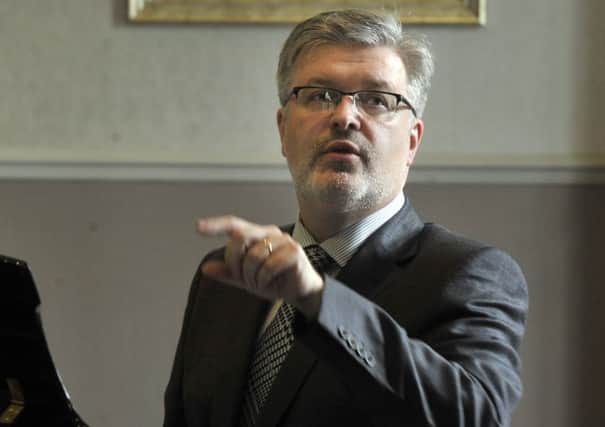Preview: James MacMillan conducting the BBC SSO


In tonight’s BBC Scottish Symphony Orchestra concert – dedicated entirely to his own music and which he himself is conducting – James MacMillan plans to settle some old scores.
No, this is not some crazy act of vengeance by Scotland’s foremost living composer. Rather, it is a potentially fascinating opportunity to hear two previously unperformed orchestral works dating from his student days in the 1980s. By his own reckoning, they hold DNA traces of the distinctive language we now instantly recognise as his, even after the “tidying up” MacMillan felt was necessary before “letting them loose” for the first time on the public.
Advertisement
Hide AdWhich is why tonight’s BBC SSO Hear and Now concert – also featuring revised versions of his 2012 string quartet For Sonny and 1998 brass fanfare Exsultet, plus the Scottish Premiere of A Deep but Dazzling Darkness, written in 2002 for solo violin, ensemble and tape – is highly significant in helping us contextualise a vitally important missing part of MacMillan’s creative path: those apprentice years leading up to his famous BBC Proms debut in 1990, when the premiere of The Confession of Isobel Gowdie, championed by Jerzy Maksymiuk and the BBC SSO, sent a packed Royal Albert Hall audience wild with excitement, stamping and screaming like rock fans – the very moment that propelled MacMillan to instant international fame.
So why is the recovery process of these two earlier works happening now? MacMillan explains: “I had been feeding some old scores into my publishers, Boosey & Hawkes, most of which were choral works, when I discovered two orchestral works I had forgotten about.”
The first to surface was The Keening, written between 1985 and 1987 as part of his PhD studies under John Casken at Durham University, and inspired by an ancient form of vocal lament associated with mourning found in the folk traditions of Ireland and northern Scotland.
“Nobody asked for it at the time, and almost immediately things got very busy for me,” he recalls.
Sure enough, within a year he was busy writing to commission, such orchestral works as Tryst and, more sensationally, The Confession of Isobel Gowdie.
“In the melee of all that, The Keening simply got forgotten,” he says. “It was my second orchestral piece, but it had been heard nowhere other than in my own head.”
Advertisement
Hide AdWhich begs the question: what of MacMillan’s first orchestral piece? That, too, was to surface in the tidying up process, and will also be premiered tonight as the retitled Symphonic Study, written as a graduation piece during the composer’s final year at Edinburgh University in 1981. “It had some other title at the time, a typically useless student one,” he chuckles, refusing to give the original one away.
But he openly admits to how strange it has been revisiting these early pieces three decades on. “It’s a bit like reading old lectures you did when you were young; seeing your old self there, and realising you’ve become very different. But there’s a lot there that still means something.”
Advertisement
Hide AdDoes that include anything that might help us understand why his later music bears such distinctive hallmarks? Those tantalisingly difficult ornamentations, fused together in what he himself has described as “a cloud of heterophony”; those intoxicating juxtapositions of comforting tonality and mind-numbing dissonance; those pounding brass rhythms that assert rugged motorised stability on MacMillan’s multi-dimensional trademark textures?
“Looking back, I can see my fascination for folk music and how it was beginning to find a place in my orchestral music,” he says. “I was listening then to a lot of The Whistlebinkies. I was also fascinated by Gaelic psalm singing, particularly as a result of my studies with Lyell Cresswell in Edinburgh. He introduced me to a lot of new and challenging music, but in particular his own Salm, one of the first pieces to explore Gaelic psalm singing in orchestral sound.
“I suppose composers like William Sweeney, Edward McGuire and Judith Weir were also fascinated by similar things, so I can see all these influences coming to bear on me at the time. The Scottish thing – the grace notes, all the ornamentation – has never really gone away. I write it without thinking now; it’s in my bloodstream, and it’s there in The Keening.”
So why the need to touch up two early orchestral pieces rather than leave them as they are? “Over the years things have simplified in my music,” he says. “Things that were complex then I now realise didn’t need to be. The experience of being involved in so many performances of my music taught me that.”
Not surprisingly, the earlier undergraduate Symphonic Study required the most invasive “surgery”. “Some things had to be made more practical, like a passage I’d scored for the whole viola section but, on reflection, was going to work better simply as a viola solo. I’d never been through it before with a view to performance. It was interesting to rediscover what the influences were at the time, but equally to appreciate how I’d do things differently now.”
MacMillan is as excited about unveiling tonight’s archaeological self-discoveries as he would be about premiering a brand new work. But it’s an occasion that holds even more significance for the 54-year-old composer – his first conducting appearance with a Scottish orchestra in ten years; the start of a year in which he will conduct more with the SSO, including March’s Commonwealth Games concert in Glasgow and the Orchestra’s symbolic tour of India; and his new role in October as festival director, launching the first annual Cumnock Tryst Festival in the Ayrshire town of his birth.
Advertisement
Hide AdMore importantly, it seems that Scotland has reclaimed its most original and creative musical voice.
James MacMillan conducts the BBC SSO in Hear and Now, a programme of his own music, tonight at the City Halls, Glasgow